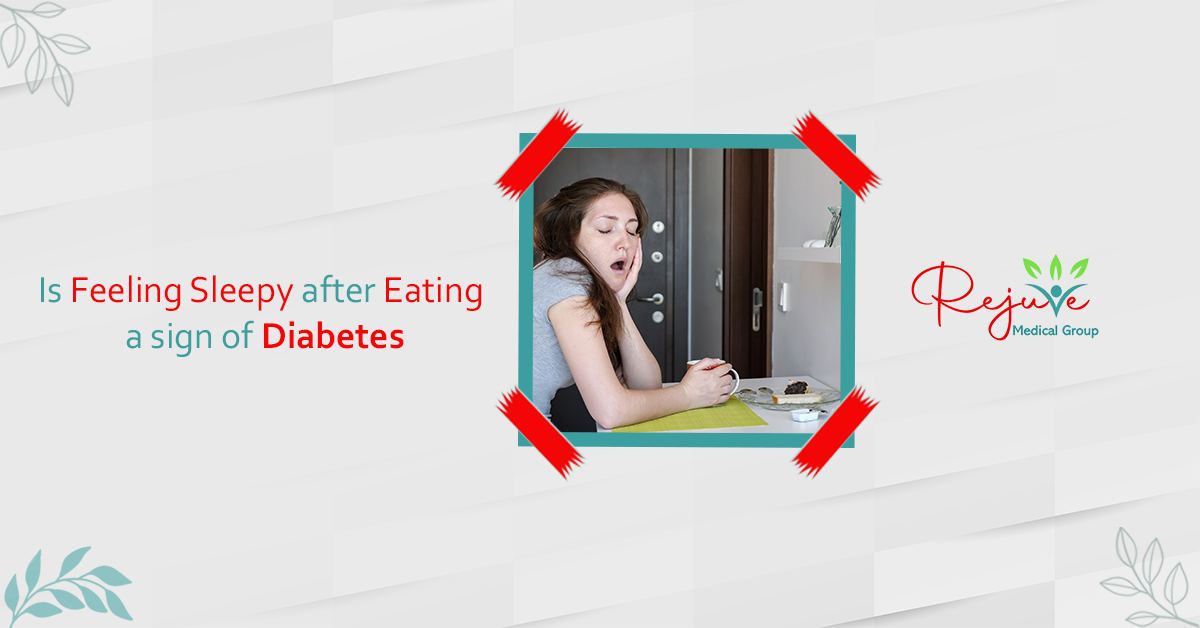Do you often feel drowsy after a meal and wonder if it’s normal? While a bit of fatigue post-meal is common, persistent or excessive sleepiness could raise questions about underlying health issues, including diabetes.
In this article, we’ll explore why you might feel sleepy after eating, how it can relate to diabetes, and actionable steps to maintain your energy and overall wellness. Additionally, we’ll discuss how your diet especially carbohydrate choices impacts your energy levels.
At RejuVe Medical Group, we aim to empower you with knowledge for balanced energy and a healthier life. If you’re ready to address post-meal fatigue and boost your vitality, we’re here to help!
Why Do We Feel Sleepy After Eating?
After eating, your body redirects blood flow to the stomach and intestines to aid digestion. This shift in energy can cause mild fatigue, which is completely normal. However, significant or recurring drowsiness may warrant closer examination.
Carbohydrate-heavy meals—like those featuring white bread, pasta, or sugary snacks—can cause sharp spikes in blood sugar, followed by rapid drops. This fluctuation may leave you feeling drained. Simple carbohydrates, which lack fiber, are particularly likely to contribute to these energy swings.
Is Feeling Sleepy After Eating a Sign of Diabetes?
While not always a direct sign, feeling unusually tired after meals can sometimes indicate diabetes or prediabetes. Diabetes affects how your body processes blood sugar (glucose). For people with diabetes, blood sugar levels can rise excessively after meals and later drop too low, both of which can cause fatigue.
Prediabetes, which often precedes diabetes, also leads to difficulties with blood sugar regulation and can result in post-meal tiredness. If you’ve wondered, “Does prediabetes cause fatigue?”—the answer is yes. It stems from the body’s struggle to use insulin effectively, a key factor in regulating energy.
Does Sugar Make You Sleepy?
If you’ve ever thought, “Sugar makes me sleepy,” you’re not alone. High-sugar foods can cause a rapid rise in blood glucose, followed by a steep decline. For individuals with diabetes or insulin resistance, these drops are often more pronounced, contributing to post-meal fatigue.
Reducing your intake of sugary foods and focusing on balanced meals can help maintain steady energy levels throughout the day.
The Role of Carbohydrates in Fatigue
Carbohydrates are a primary energy source, but not all carbs are equal. Simple carbs like white bread and processed snacks spike blood sugar quickly, leading to energy crashes. In contrast, complex carbs, such as whole grains and vegetables, provide a slower, steadier release of energy.
To combat fatigue:
- Pair carbohydrates with protein, healthy fats, and fiber, which slow digestion and stabilize blood sugar levels.
- Aim for balanced meals to avoid the highs and lows that lead to tiredness.
Why Diabetics May Feel Tired and Hungry
Diabetes can alter how the body uses glucose, its main energy source. When cells can’t access glucose due to insulin resistance or insufficient insulin, the body signals hunger. This can lead to a cycle of eating and persistent fatigue, especially if blood sugar levels are not well managed.
Managing blood sugar levels through diet, medication, and regular monitoring is essential for maintaining energy and reducing hunger.
Could Something Else Be Causing Post-Meal Fatigue?
While fatigue after eating is often linked to diet or diabetes, other factors could be at play, including:
- Food intolerances
- Digestive issues
- Hormonal imbalances
- Certain medications
If post-meal drowsiness is a frequent concern, consult your doctor to explore potential causes and develop a tailored plan for your health.
Signs and Symptoms of Diabetes
Feeling sleepy after eating is just one possible sign of diabetes. Other symptoms include:
- Increased thirst
- Frequent urination
- Unexplained weight loss
- Constant fatigue
- Blurred vision
- Slow-healing wounds
If you notice these symptoms, it’s crucial to see a healthcare provider for evaluation and guidance.
Tips to Manage Post-Meal Sleepiness
Whether or not diabetes is the cause, these strategies can help you feel more energized after meals:
- Choose Balanced Meals: Include protein, healthy fats, and fiber to stabilize blood sugar.
- Avoid Overeating: Smaller, more frequent meals are easier for the body to digest.
- Limit Sugary Foods: Reduce sugar intake to prevent energy crashes.
- Stay Active After Eating: A light walk aids digestion and keeps you alert.
- Stay Hydrated: Dehydration can contribute to fatigue, so drink plenty of water.
When to Seek Medical Advice
If you frequently feel sleepy after meals, especially alongside other symptoms of diabetes, it’s important to consult a doctor. Early detection and treatment can prevent complications and improve your quality of life.
Final Thoughts: Is Post-Meal Sleepiness a Sign of Diabetes?
While feeling sleepy after eating is not always linked to diabetes, it can be a sign of blood sugar imbalance. Paying attention to your diet, digestion, and overall health can help you manage fatigue and maintain energy. If you suspect diabetes or have ongoing concerns, seeking medical advice is the best step toward clarity and care.
FAQs
Does diabetes leave you constantly tired?
Yes, fatigue is common in diabetes due to blood sugar fluctuations and insulin resistance.
What causes diabetics to frequently feel hungry?
The body struggles to use glucose for energy, triggering hunger signals even after eating.
For support in managing post-meal fatigue or other health concerns, contact RejuVe Medical Group today. Together, we can help you achieve balanced energy and better health!




No comment